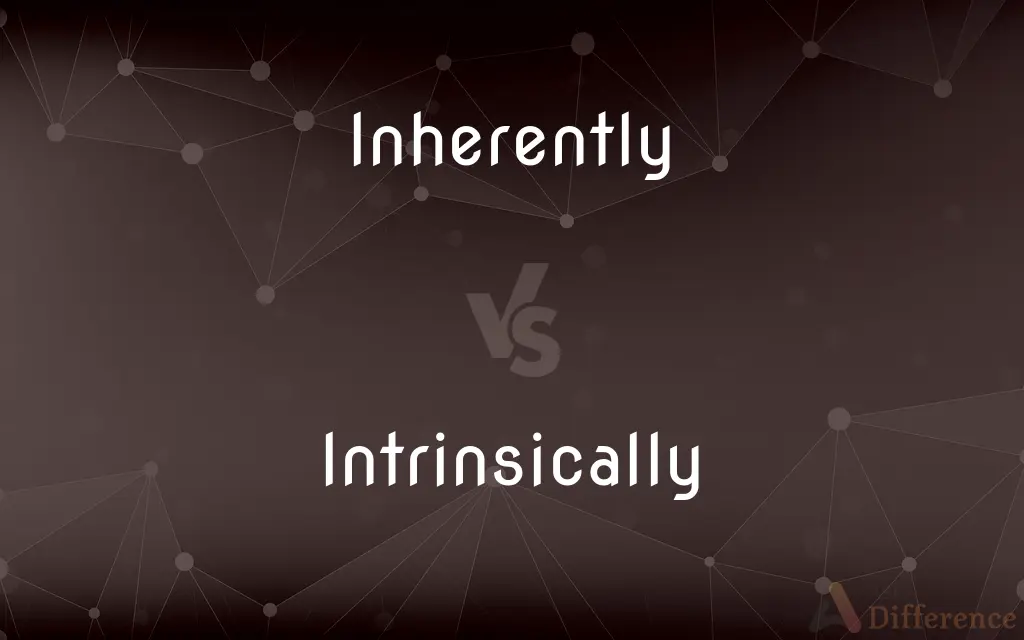Inherently vs. Intrinsically — What's the Difference?
Edited by Tayyaba Rehman — By Fiza Rafique — Updated on April 29, 2024
Both terms imply essential qualities, but "inherently" refers to characteristics that are a natural, necessary part of something, whereas "intrinsically" points to something being an integral, inseparable part.

Difference Between Inherently and Intrinsically
Table of Contents
ADVERTISEMENT
Key Differences
Inherently refers to qualities that are a natural and essential part of something, suggesting that these traits cannot be separated from the object or concept in question. Intrinsically, on the other hand, emphasizes that the qualities are not only essential but also fundamentally inherent to an entity, often conveying a deeper, almost indispensable connection.
Inherently is often used to describe characteristics that are naturally occurring within an entity from the beginning, suggesting that these traits are permanent and unchangeable. Intrinsically implies that these characteristics are not just present but are central to the nature or existence of the entity, highlighting an even stronger link between the trait and the entity's identity.
While inherently might suggest that a property or quality is inevitably part of something due to its nature or essence, intrinsically goes further by imbuing the quality or property with a fundamental value or importance that is inseparable from the entity itself.
In many contexts, inherently is used when discussing topics where the natural aspect or 'built-in' nature of a characteristic is in focus. In contrast, intrinsically is preferred in philosophical, moral, or value-based discussions where the essence or indispensable quality of a characteristic is being emphasized.
The use of inherently often appears in scientific, legal, or factual discussions, highlighting characteristics that are assumed as a base or core attribute. Intrinsically, however, is more common in theoretical, ethical, or qualitative analyses, where the depth of integration of a characteristic within an entity is crucial.
ADVERTISEMENT
Comparison Chart
Definition
Naturally part and necessary
Essential and inseparable
Usage Context
Often factual, scientific
Philosophical, moral, value-based
Emphasis
On being a natural part
On being fundamentally necessary
Implication
Trait is permanent and unchangeable
Trait is deeply integrated and crucial
Example Usage
Inherently flawed system
Intrinsically valuable concept
Compare with Definitions
Inherently
Built-in, fundamental characteristic.
Curiosity is inherently human.
Intrinsically
Belonging naturally; essential.
Human rights are intrinsically important.
Inherently
As an inherent or essential part.
The system is inherently biased.
Intrinsically
In an intrinsic manner.
The artwork is intrinsically valuable.
Inherently
Naturally occurring from within.
Diamonds are inherently hard.
Intrinsically
Fundamentally, at its core.
The theory is intrinsically sound.
Inherently
By the very nature of the thing in question.
Trust is inherently necessary in relationships.
Intrinsically
Relating to the essential nature of something.
The concept is intrinsically complex.
Inherently
Existing in something as a permanent and inseparable element.
The law is inherently complex.
Intrinsically
As a basic and fundamental part.
Freedom is intrinsically linked to democracy.
Inherently
Existing as an essential constituent or characteristic; intrinsic
The dangers inherent in the surgery.
The inherent instability of financial markets.
Intrinsically
Of or relating to the essential nature of a thing; inherent.
Inherently
In an inherent way; naturally, innately.
Intrinsically
(Anatomy) Situated within or belonging solely to the organ or body part on which it acts. Used of certain nerves and muscles.
Inherently
By inherence; inseparably.
Matter hath inherently and essentially such an internal energy.
Intrinsically
In an intrinsic manner; internally; essentially.
Intrinsically
Internally; in its nature; essentially; really; truly.
A lie is a thing absolutely and intrinsically evil.
Intrinsically
With respect to its inherent nature;
This statement is interesting per se
Common Curiosities
Is inherently more about nature or nurture?
Inherently is more about nature, as it pertains to qualities naturally present.
How do I decide whether to use inherently or intrinsically?
Consider whether the emphasis is on the natural part of an entity (inherently) or on the essential, inseparable importance of a quality (intrinsically).
Can a concept be intrinsically good?
Yes, if it is considered fundamentally good in its essence.
What does intrinsically mean?
It refers to something being fundamentally and inseparably embedded within something else.
What is an example of something inherently dangerous?
Radioactive materials are inherently dangerous due to their natural properties.
Can something be inherently and intrinsically the same?
While both suggest essential qualities, intrinsically often conveys a deeper, fundamental importance.
Is intrinsically used in moral discussions?
Yes, it is often used in contexts discussing fundamental values or ethics.
Can inherently be used in a scientific context?
Yes, it is commonly used to describe natural phenomena or properties.
What does inherently mean?
It means existing as a natural, essential part of something.
Why is ethics considered intrinsically important?
Because it fundamentally shapes human conduct and societal norms.
What might be considered intrinsically valuable?
Knowledge is often considered intrinsically valuable for its own sake.
Is intrinsic value subjective?
Yes, what is considered intrinsically valuable can vary between cultures and individuals.
Is there a philosophical debate around intrinsic vs. inherent value?
Yes, philosophers often debate the nature of value and whether properties are intrinsic or merely perceived as inherent.
Can something become intrinsically important over time?
Typically, intrinsic importance is considered as part of the fundamental nature of something, not acquired.
Does inherently imply a negative trait?
Not necessarily, it can describe any trait that is naturally part of something.
Share Your Discovery

Previous Comparison
Introduction vs. Preliminary
Next Comparison
Dignity vs. EsteemAuthor Spotlight
Written by
Fiza RafiqueFiza Rafique is a skilled content writer at AskDifference.com, where she meticulously refines and enhances written pieces. Drawing from her vast editorial expertise, Fiza ensures clarity, accuracy, and precision in every article. Passionate about language, she continually seeks to elevate the quality of content for readers worldwide.
Edited by
Tayyaba RehmanTayyaba Rehman is a distinguished writer, currently serving as a primary contributor to askdifference.com. As a researcher in semantics and etymology, Tayyaba's passion for the complexity of languages and their distinctions has found a perfect home on the platform. Tayyaba delves into the intricacies of language, distinguishing between commonly confused words and phrases, thereby providing clarity for readers worldwide.
















































